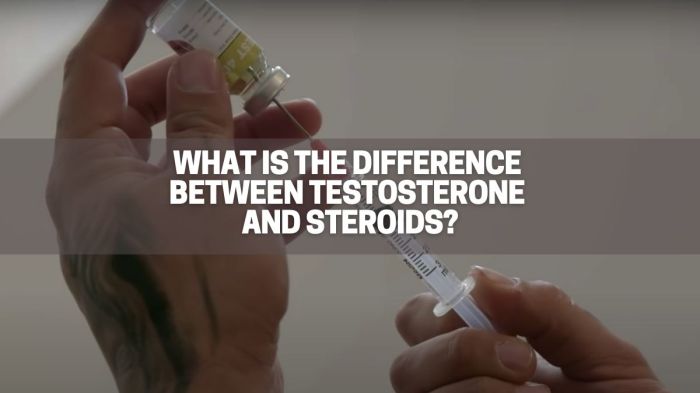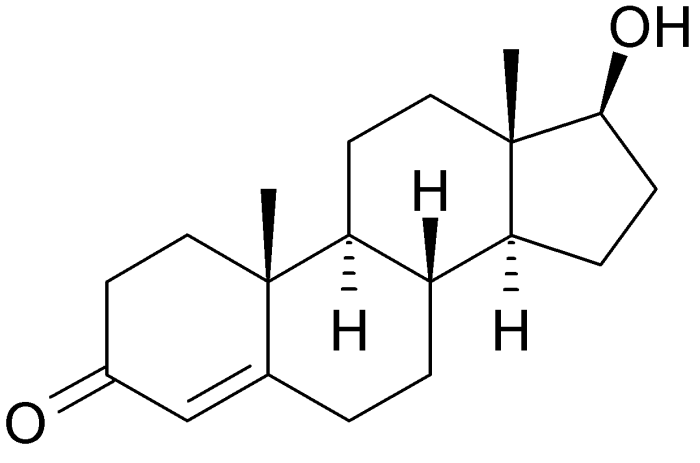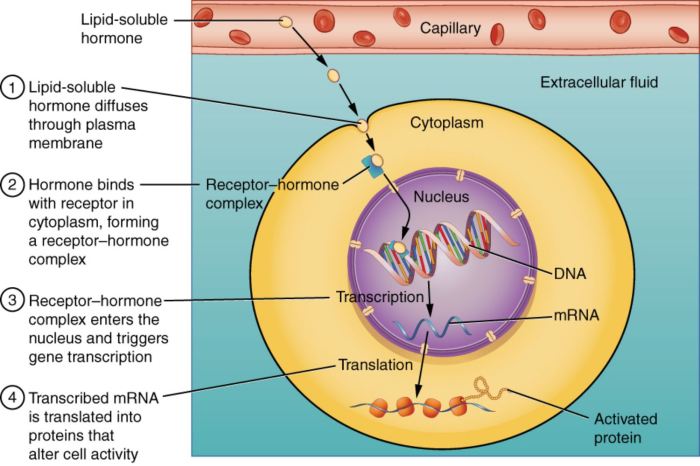Is testosterone a steroid hormone – Testosterone, a steroid hormone, plays a crucial role in human development, influencing physical traits, reproductive function, and overall well-being. Its intricate mechanisms and therapeutic applications make it a fascinating subject for scientific exploration.
Delving into the realm of testosterone, we will uncover its chemical structure, biosynthesis, and the myriad of effects it exerts on the human body. From muscle development to bone health and mood regulation, testosterone’s influence is far-reaching. We will also examine its therapeutic uses, detection methods, and factors that can impact its levels.
Biosynthesis and Regulation

Testosterone, a primary sex hormone in males, is synthesized in the testes. The process of testosterone biosynthesis is tightly regulated by the hypothalamus, pituitary gland, and testes, forming a complex feedback loop.
The hypothalamus secretes gonadotropin-releasing hormone (GnRH), which stimulates the pituitary gland to release luteinizing hormone (LH) and follicle-stimulating hormone (FSH). LH acts on the testes to stimulate the production of testosterone by Leydig cells.
Factors Affecting Testosterone Levels
Testosterone levels can be influenced by various factors, including age, diet, and exercise.
- Age:Testosterone levels naturally decline with age, starting around age 30.
- Diet:Certain foods, such as zinc-rich foods and cruciferous vegetables, may support testosterone production.
- Exercise:Regular exercise, particularly resistance training, can increase testosterone levels.
Effects on the Body
Testosterone plays a crucial role in various bodily functions, affecting muscle mass, bone health, cardiovascular function, and mood. Understanding its effects is essential for maintaining overall well-being.
Effects on Muscle Mass and Strength:Testosterone is a potent anabolic hormone that promotes muscle growth and strength. It increases protein synthesis, reduces muscle breakdown, and enhances the body’s ability to utilize nutrients for muscle development. As a result, higher testosterone levels are associated with increased muscle mass, strength, and power.
Bone Health
Testosterone is vital for bone health, particularly in men. It stimulates the production of osteoblasts, cells responsible for bone formation, and inhibits osteoclasts, cells that break down bone. Adequate testosterone levels promote bone density, strength, and reduce the risk of osteoporosis, a condition characterized by weak and brittle bones.
Cardiovascular Function
Testosterone has a complex relationship with cardiovascular function. While it can increase red blood cell production, improving oxygen delivery to tissues, it may also elevate blood pressure in some individuals. Studies suggest that maintaining healthy testosterone levels is important for overall cardiovascular health, but further research is needed to fully understand its impact.
Mood
Testosterone has been linked to mood regulation. Higher testosterone levels are often associated with increased energy, motivation, and well-being. Conversely, low testosterone levels may contribute to fatigue, irritability, and decreased libido. However, the relationship between testosterone and mood is complex and varies among individuals.
Risks and Side Effects
While testosterone is essential for many bodily functions, both high and low levels can pose risks. High testosterone levels can lead to acne, hair loss, aggression, and an increased risk of prostate cancer. Conversely, low testosterone levels can cause decreased muscle mass, bone loss, erectile dysfunction, and fatigue.
It is important to note that testosterone levels vary naturally throughout life and can be affected by factors such as age, genetics, and lifestyle. Consult a healthcare professional if you have concerns about your testosterone levels or are experiencing any of the symptoms associated with high or low testosterone.
Therapeutic Uses: Is Testosterone A Steroid Hormone

Testosterone is a vital hormone that plays a crucial role in the development and maintenance of male characteristics. It also has therapeutic applications in medicine.
Hormone Replacement Therapy
Testosterone replacement therapy (TRT) is used to treat conditions that result in low testosterone levels, such as hypogonadism. This condition can occur due to various factors, including genetic disorders, injury, or disease. TRT involves administering testosterone to restore normal hormone levels and alleviate symptoms associated with low testosterone, such as low libido, erectile dysfunction, and fatigue.
Treatment for Certain Medical Conditions, Is testosterone a steroid hormone
Testosterone therapy has also been used to treat other medical conditions, including:
Anemia
Testosterone can stimulate the production of red blood cells, potentially benefiting individuals with certain types of anemia.
Osteoporosis
Testosterone can increase bone density and reduce the risk of fractures in men with osteoporosis.
Muscle wasting
Testosterone can promote muscle growth and strength, making it beneficial for individuals with muscle-wasting conditions.
Forms of Testosterone and Administration Methods
Testosterone is available in various forms for medical use, including:
Injections
Testosterone injections are administered intramuscularly or subcutaneously. They provide a sustained release of testosterone over time.
Transdermal patches
These patches are applied to the skin and release testosterone through the skin.
Gels and creams
Testosterone gels and creams are applied directly to the skin. They are absorbed through the skin and provide a more gradual release of testosterone.
Benefits and Risks of Testosterone Therapy
Testosterone therapy can provide several benefits, including:
- Improved sexual function
- Increased muscle mass and strength
- Reduced body fat
- Improved mood and cognitive function
However, testosterone therapy also carries potential risks, such as:
- Increased risk of heart disease
- Liver damage
- Acne
- Prostate enlargement
It is important to note that testosterone therapy should be used under the supervision of a healthcare professional to ensure its safe and effective use.
Detection and Measurement

Measuring testosterone levels is crucial for diagnosing and managing various medical conditions. Several methods are employed to detect and quantify testosterone, each with its advantages and limitations.
Radioimmunoassay (RIA)
RIA is a widely used technique that involves the competitive binding of testosterone to a specific antibody. A known amount of radioactive testosterone is added, and the amount of bound and unbound testosterone is measured. The ratio of bound to unbound testosterone determines the concentration of testosterone in the sample.
Liquid Chromatography-Mass Spectrometry (LC-MS)
LC-MS is a highly sensitive and specific method that separates and quantifies testosterone based on its mass-to-charge ratio. This technique provides accurate and precise measurements, making it the gold standard for testosterone testing.
Enzyme-Linked Immunosorbent Assay (ELISA)
ELISA is a simple and cost-effective method that utilizes antibodies to detect testosterone. A colorimetric reaction is produced when testosterone binds to the antibodies, and the intensity of the color is proportional to the testosterone concentration.
Significance of Testosterone Levels
Testosterone levels play a vital role in clinical practice and research. They are used to:
- Diagnose conditions such as hypogonadism, hypergonadism, and polycystic ovary syndrome (PCOS)
- Monitor testosterone replacement therapy
- Evaluate the effects of medications or supplements on testosterone levels
- Study the relationship between testosterone and various health outcomes
Factors Affecting Accuracy
Several factors can affect the accuracy of testosterone measurements, including:
- Time of day (testosterone levels fluctuate throughout the day)
- Exercise (can temporarily increase testosterone levels)
- Medications (some medications can interfere with testosterone measurements)
- Stress (can lower testosterone levels)
- Laboratory techniques (different methods may yield slightly different results)
Summary
In conclusion, testosterone, a steroid hormone, stands as a vital regulator of human physiology. Its intricate interplay with the body’s systems highlights its profound impact on our physical, reproductive, and emotional well-being. Understanding testosterone’s mechanisms and therapeutic applications empowers us to harness its potential for improved health and vitality.
Questions and Answers
What are the main functions of testosterone?
Testosterone plays a key role in muscle development, bone health, reproductive function, and mood regulation.
How is testosterone produced?
Testosterone is primarily produced in the testes in males and the ovaries in females, through a process called biosynthesis.
What are the potential risks of high or low testosterone levels?
High testosterone levels can lead to aggression, acne, and hair loss, while low levels can cause fatigue, decreased muscle mass, and erectile dysfunction.
What are the therapeutic uses of testosterone?
Testosterone is used in hormone replacement therapy and to treat certain medical conditions, such as hypogonadism.
How is testosterone measured?
Testosterone levels are typically measured through blood tests.